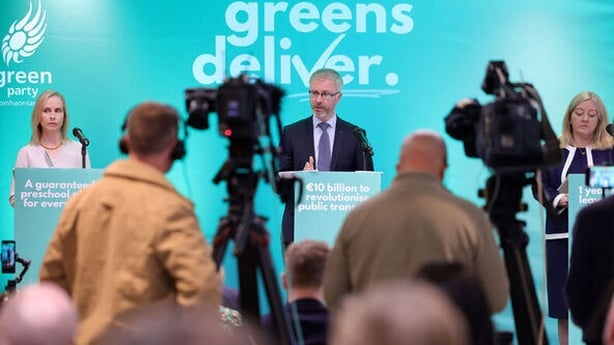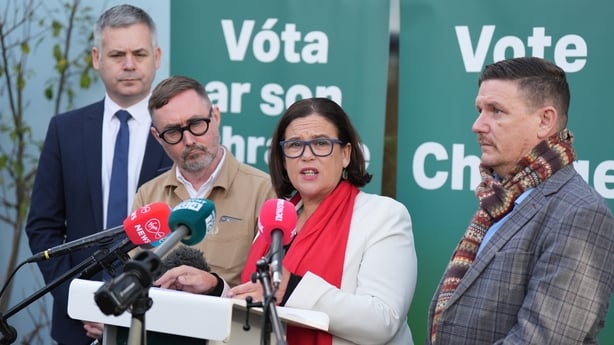"Words cost nothing, it's action that counts," is quite the commitment for any politician to make in the middle of a General Election campaign.
However, that's exactly how Green Party leader Roderic O'Gorman framed his approach to the ongoing race at the launch of his party's manifesto.
The catchy comment was supported by a flurry of election promises as part of the Greens' launch of the centre-piece document of its election campaign.
But with a crowded political field and more than one rival eyeing up its coalition position, will the Greens' actions ultimately speak louder than the campaign trail words from all parties that are currently grabbing the headlines?
Manifesto
The Greens' manifesto promises are focused on a number of areas it believes will help grow new voters while still watering the political support which bloomed for it in 2020.
It's unlikely to be a shock to anyone that many of the key pledges have more than a tinge of, well, green to them.
Chief among the promises is a €10bn plan to "supercharge" public transport, which the Greens say could be funded by €7bn of Apple tax money and €3bn from other sources to help support what the party has labelled the "poor relation" of Ireland's transport system.
The transport plans include major changes for Dublin, including BusConnects and the start of construction for the Metrolink, DART+ and the Luas extension - all of which could be big vote grabbers.
They also include equally eye-catching proposals outside of Ireland's biggest city, such as a light rail line for Cork city, the re-opening of the railway line from Wexford to Waterford, an upgrading of existing rail lines in Limerick and Kilkenny, and plans to "explore" the possibility of a light rail system in Galway.

In addition, the Greens want to further entice people to keep their cars at home by reducing ticket prices, including a 20% cut for adult fares, a 60% cut for young people fares and free fares for children aged under nine, as well as introducing a "climate ticket" to replace the "taxsaver ticket".
Climate action is understandably also high on the Green agenda, with the party's election manifesto saying it will introduce a €1.2bn public buildings retro-fitting fund and a €300m war chest to help businesses become more energy efficient - and, notably, tax business class flights and private jets.
The party also intends to put €200m aside to support research into new clean energy technologies, and to advocate for an EU nature restoration fund.
On housing, the Green Party has promised to build between 50,000 and 53,000 homes if it returns to government, as well as making the Help-to-Buy scheme available to renters who want to purchase their home from their landlord.
Outside of these areas, the party also says it will increase social welfare in line with wage and price inflation, expand the GP visit card to children aged eight to ten, cap crèche prices at €200 per child per month, establish a new asylum and integration agency to oversee asylum requests, increase garda numbers to 15,000, and "immediately" enact the Occupied Territories Bill.
'Stick with us’
Big promises, in other words and promises leader Roderic O’Gorman told reporters at the manifesto launch his party can deliver.
"The Green Party is the best value vote out there. We punch above our weight. We deliver for climate action, we deliver for communities and for families, and that’s why we’re asking people to stick with us in this election," he said.
It's worth remembering, of course, that while election manifesto promises set out a party's stance, not all promises tend to make it into a multi-party programme for government.
The Greens already have experience of this, having been in coalition with Fianna Fáil and Fine Gael since 2020.
At today's press conference, Mr O'Gorman said he and his party have "learned a huge amount over the last four-and-a-half years, we've gained incredible experience about the day-to-day mechanics of government".
He added that any coalition "has to be managed in such a way that you know you can talk to each other the next day about the next issue and work to get that done as well."

So, how might that conversation go, should the Green Party and its manifesto be in a position to negotiate with other parties after 29 November?
Future coalition partners
Coincidentally, on the same day as the Green manifesto was being launched in Dublin, Ireland's three biggest parties were all leaning over the political fence to have a quick chat of their own with another group which could have some influence on the outcome of the General Election 2024.
In the space of a few short hours, Fianna Fail leader Micheál Martin, Fine Gael leader Simon Harris and Sinn Féin leader Mary Lou McDonald had all popped into the Irish Farmers’ Association national council meeting.
First up was Mr Martin, who told IFA members "during my party’s time in government farming issues have always been a central focus", before not disagreeing when asked by one IFA member for an assurance if the Green Party tail "won't be wagging the dog for the next four years".
At a later chat with the IFA, Ms McDonald described carbon taxes as "lazy thoughtless policy".
Also giving his message to farmers was Simon Harris, who told the IFA he wants his party to reconnect and renew its relationship with farmers, saying "I hear politicians talking about farming in a way they wouldn't talk about any other party of the Irish economy," before adding:
"I would respectfully say to farmers that the best way they ensure that they strengthen the voice of Fine Gael in the next government is not to vote for Independents because that’s actually the situation that resulted in my party and perhaps other parties losing seats in the last election and then needing a three way coalition."
‘We deliver’
It should be noted, of course, that Fianna Fáil, Fine Gael and Sinn Féin also have climate action policies, and that today's discussions with the IFA are the reality of the election campaign trail.
However, the focus by potential partners on farmers rather than the green agenda on the same day as the Green Party launched its election manifesto is unlikely to have gone unnoticed either.
Not that any of this will worry more deep-rooted Greens too much.
The party has been here before, and it believes it can keep existing voters and potentially win over some more by outlining its climate action and environmental priorities - and how it intends to ensure they are introduced.
In his speech at the manifesto launch, Mr O’Gorman said: "Over the next weeks, voters will hear politicians making a lot of promises. But words cost nothing, it’s action that counts."
Just 17 days until we find out whose actions, rather than words, speak loudest.







